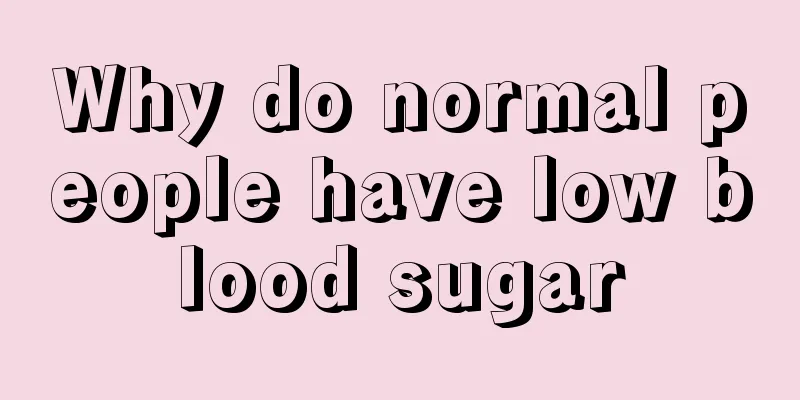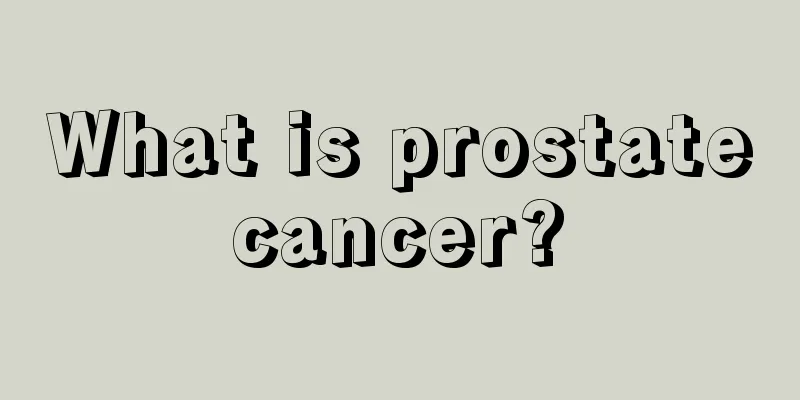Why do normal people have low blood sugar

|
As we all know, hypoglycemia is a disease. If you suffer from this disease, you will feel lack of energy and dizziness. However, many friends have found that their blood sugar levels are normal, so why do they sometimes experience hypoglycemia? In fact, hypoglycemia is very common in normal people. Generally speaking, it has a lot to do with the state of our body. What causes hypoglycemia? In daily life, in addition to high blood sugar, hypoglycemia is also worthy of attention. Many people think that as long as blood sugar is not high, there will be no major problems with the body. In fact, this idea is wrong. So what causes hypoglycemia? The main causes are (1) Fasting hypoglycemia 1. Excessive glucose utilization (1) Hyperinsulinemia: insulinoma; newborns of obese diabetics (mothers with hyperinsulinemia); drugs (such as excessive use of insulin, sulfonylurea hypoglycemic drugs, salicylates, propranolol, disopyramide, monoamine oxidase inhibitors), insulin autoimmune hypoglycemia. (2) Tumors: such as giant stromal tumors, primary liver cancer, gastrointestinal tumors and lymphosarcoma. 2. Insufficient glucose production (1) Endocrine diseases: hypopituitarism; adrenocortical insufficiency; hypothyroidism, etc. (2) Glycogen storage disease. (3) Severe liver disease and hepatic congestion. (4) End-stage renal disease. (5) Galactosemia (due to deficiency of galactose-1-phosphate uridine nucleoside convertase, galactose cannot be converted into glucose). (6) Others: long-term alcoholism (inhibition of glycogenolysis); sepsis; hunger; cachexia; strenuous exercise, etc. (II) Postprandial (reactive) hypoglycemia 1. Functional hypoglycemia (emotional instability and neurosis, more common in middle-aged women). 2. Trophic hyperinsulinemia: such as dumping syndrome after gastrectomy; after pyloroplasty and gastrojejunostomy. 3. Idiopathic spontaneous hypoglycemia in children. 4. Mild early diabetes (delayed insulin peak). What should you pay attention to when you have low blood sugar? When the fasting blood sugar concentration of an adult is lower than 4.0mmol/L, it is called hypoglycemia. However, when the blood sugar level is lower than this, some symptoms will appear, which is called hypoglycemia. So what should we pay attention to when eating a low-glycemic diet? First, eat small and frequent meals It is best to eat small meals frequently for hypoglycemia, and limit the number of meals to about 6-8 per day. Eating a small snack before going to bed can effectively treat hypoglycemia. In addition, remember to alternate foods and don't eat the same food all the time. Also, be aware of food allergies. Second, the foods that should be restricted should be strictly controlled. Strictly control the intake of monosaccharide foods and eat less refined and processed products, such as fast food or soda, alcohol, salt, etc. Don't eat foods that are too high in sugar. Third, increase high-fiber diet A high-fiber diet helps stabilize blood sugar levels. When blood sugar is low, fiber can be combined with protein foods, such as bran pancakes with raw cheese or almond jam. Eat fresh apples instead of applesauce; the fiber in apples can curb blood sugar fluctuations. Fiber itself can also delay the decline of blood sugar. Take cellulose half an hour before meals to stabilize blood sugar. Taking spirulina tablets between meals can further stabilize blood sugar levels. Fourth, a balanced diet The diet should be balanced, containing at least 50-60% carbohydrates (the same dietary principles as diabetics), including vegetables, brown rice, avocado, konjac, seeds, nuts, grains, lean meat, fish, yogurt, and raw cheese. Fifth, mainly fruits with high sugar content Fruits can supplement a certain amount of sugar, but there are also things to pay attention to when eating fruits. So what are the things you should pay attention to? The sugar content in fruits is as follows for reference: Sweet fruits such as peaches, watermelons, pears, and oranges do not actually have a high sugar content and are low-sugar or medium-sugar fruits. However, red fruits and dates, which have a sweet and sour taste, are high-sugar fruits and are not suitable for diabetic patients. High-sugar fruits: bananas, grapes, lychees, longans, dates, and red fruits. Medium-sugar fruits: watermelon, apples, pears, tangerines, strawberries, oranges, kiwis, and pineapples. Low-sugar fruits: grapefruit, cucumbers, tomatoes, carambolas, green plums, and cherries. Conclusion: The above content will introduce to you the causes of hypoglycemia and what things you need to pay attention to in daily life. There are many things that we need to pay attention to in daily life. If you have hypoglycemia, remember to carry some snacks with you. When you don’t have enough energy, replenish it in time, which can effectively alleviate the hypoglycemia. |
<<: What kind of examination is done when checking the intestines
>>: What is the normal lactate level?
Recommend
What should I do if peach hair gets on my face?
In summer, everyone likes to eat peaches. Peaches...
Patients with pancreatic cancer who cannot undergo surgery should choose supportive treatment methods
If pancreatic cancer patients cannot undergo surg...
What are the causes of lung cancer?
What are the causes of lung cancer? Experts say t...
What are the causes of bleeding after treatment of nasopharyngeal carcinoma? What is the health care knowledge?
We usually ignore some minor problems until the d...
How to hydrate your face if it is severely dehydrated
Many people's faces are not smooth and white....
How to take care of breast cancer after surgery? Five common treatment methods after breast cancer surgery
After breast cancer surgery, you should pay atten...
Whole wheat flour calories
Flour is a common staple food in our lives, and m...
Is bladder cancer life-threatening?
It depends on whether your tumor is benign or mal...
Does skin cancer cause lumps?
After suffering from skin cancer, only by fightin...
Chemotherapy alone cannot completely cure colon cancer
I am a 26-year-old boy who had surgery for colon ...
Are there any misunderstandings about prostate cancer?
Recognize the misunderstanding: Eating tomato sau...
What are the steps to wash your hair correctly?
I believe everyone knows that hair is a vital par...
Is prostate cancer contagious?
Prostate cancer is not contagious. The disease is...
Consequences of timing belt breakage
We know that the main source of power for a car t...
If you put these 5 things in the bathroom, beware of cancer for the whole family
Cancer is the number one killer of humans, and it...









